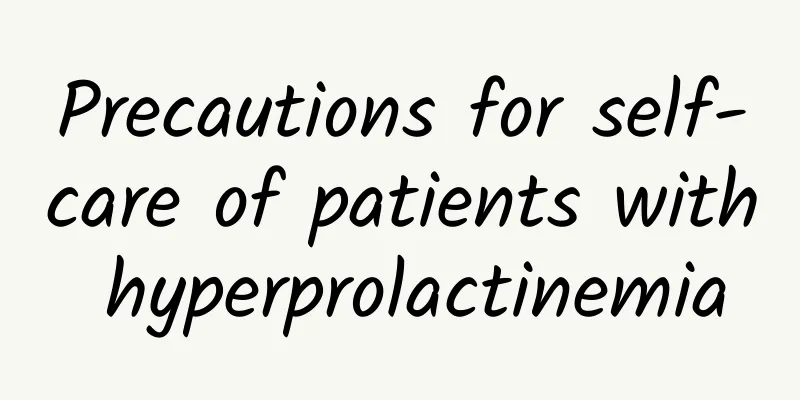Precautions for self-care of patients with hyperprolactinemia

|
The life care methods for hyperprolactinemia need to be actively grasped. Only by correctly grasping the life care methods for hyperprolactinemia can we help everyone actively prevent and control the disease. Next, we will give a detailed introduction to what patients with hyperprolactinemia should pay attention to in self-care. Lifestyle and health care methods for hyperprolactinemia: 1. Drink more water: Drink more water or juice. It can also effectively control body temperature. 2. Face life with optimism: Although women around 50 may face many new problems, such as their children growing up and starting their own families, which may bring some loneliness, they can still live a fulfilling life during this period. For example, they can continue to go to school and learn things that they wanted to learn but didn't have time to learn when they were young, or do some sports they like. Walking, jogging, cycling, dancing, skipping rope, swimming, etc. are all good choices. These will make people feel happy and forget their worries. 3. Maintain a regular sex life: Regular sex life is not easy to make the skin hot. It can also indirectly stimulate the degenerated ovaries to ease the hormone system and prevent a sharp drop in estrogen. 4. Strengthen physical fitness, improve health level, strengthen physical exercise, do health exercises or practice Tai Chi regularly. 5. Avoid mental stimulation, stabilize emotions, and keep the blood flowing smoothly. During menstruation, you should keep warm, especially below the waist. Keep your feet away from cold, avoid cold water, and avoid eating raw and cold fruits. 6. During menstruation, the body's resistance is weak. Avoid heavy physical labor, pay attention to the balance between work and rest, and coordinate the Chong and Ren meridians. Do not take cold medicines during menstruation. Strengthen nutrition, pay attention to the spleen and stomach, and eat more meat, poultry eggs, milk and fresh vegetables when the appetite is good. Do not eat spicy and stimulating foods. 7. Remove chronic lesions, breastfeed for a short period of time, be cautious in artificial abortion, and correctly master oral contraceptives. Obese patients should appropriately limit their diet and water and salt intake. The above-mentioned lifestyle health care methods for hyperprolactinemia are relatively common, and everyone must actively grasp them. Of course, after mastering the lifestyle health care methods for hyperprolactinemia, everyone must also actively consult the advice of relevant experts to restore everyone's safety and health. |
<<: How to properly care for patients with hyperprolactinemia after surgery
>>: Basic nursing routine measures for hyperprolactinemia
Recommend
Obesity is caused by poor circulation! Doctor: Massage 3 acupuncture points and drink fat-reducing and blood-stasis-removing tea
"Doctor, I don't eat much and I exercise...
Why do unmarried women with no sex life develop adnexitis?
Although adnexitis often occurs in married women ...
Experts teach everyone how to correctly understand chronic adnexitis
Many female friends may be unfamiliar with chroni...
Asparagus is the king of vegetables. It not only improves liver function, but is also great for weight loss!
Asparagus is known as the king of vegetables. It ...
Do multiple uterine fibroids require surgery?
Do multiple uterine fibroids require surgery? Whe...
How to get pregnant with premature ovarian failure
How to get pregnant with premature ovarian failur...
What are the main symptoms of ectopic pregnancy?
What are the symptoms of ectopic pregnancy? Are t...
What are the hazards of having sex after abortion? Five aspects of nursing care should be done after abortion
Many young people do not pay attention to their p...
Common causes of white lesions on the vulva
What causes white lesions of the vulva? White les...
Women's bad living habits are the cause of uterine fibroids
The cause of uterine fibroids is closely related ...
Will cervical erosion cause stomach pain?
Will cervical erosion cause stomach pain? Cervica...
Which hospital is reliable for abortion?
Nowadays, many women choose to end their pregnanc...
Causes of incomplete abortion
Incomplete abortion means that the embryonic sac ...
Check for symptoms of premature ovarian failure
If you suspect premature ovarian failure, you sho...
What are the symptoms of ectopic pregnancy
What are the symptoms of ectopic pregnancy? Under...









